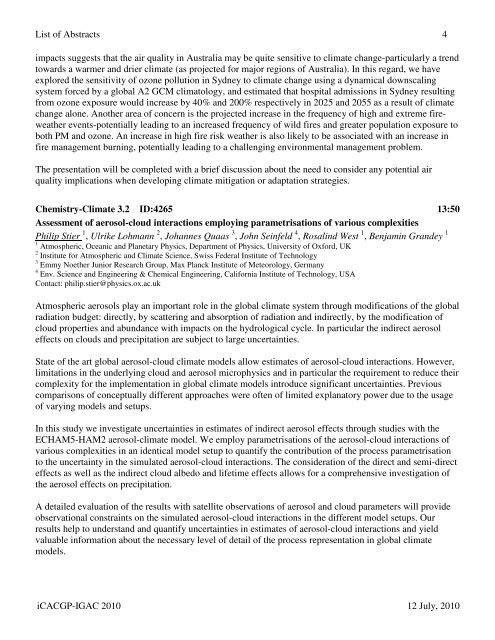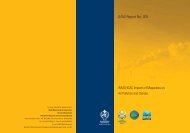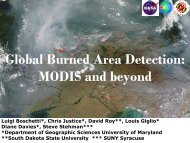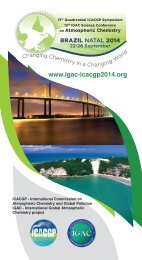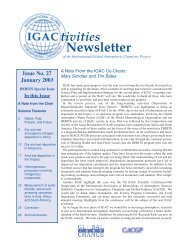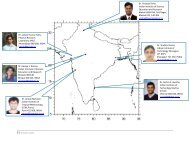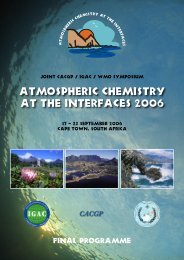Download Abstracts Here - IGAC Project
Download Abstracts Here - IGAC Project
Download Abstracts Here - IGAC Project
You also want an ePaper? Increase the reach of your titles
YUMPU automatically turns print PDFs into web optimized ePapers that Google loves.
List of <strong>Abstracts</strong> 4impacts suggests that the air quality in Australia may be quite sensitive to climate change-particularly a trendtowards a warmer and drier climate (as projected for major regions of Australia). In this regard, we haveexplored the sensitivity of ozone pollution in Sydney to climate change using a dynamical downscalingsystem forced by a global A2 GCM climatology, and estimated that hospital admissions in Sydney resultingfrom ozone exposure would increase by 40% and 200% respectively in 2025 and 2055 as a result of climatechange alone. Another area of concern is the projected increase in the frequency of high and extreme fireweatherevents-potentially leading to an increased frequency of wild fires and greater population exposure toboth PM and ozone. An increase in high fire risk weather is also likely to be associated with an increase infire management burning, potentially leading to a challenging environmental management problem.The presentation will be completed with a brief discussion about the need to consider any potential airquality implications when developing climate mitigation or adaptation strategies.Chemistry-Climate 3.2 ID:4265 13:50Assessment of aerosol-cloud interactions employing parametrisations of various complexitiesPhilip Stier 1 , Ulrike Lohmann 2 , Johannes Quaas 3 , John Seinfeld 4 , Rosalind West 1 , Benjamin Grandey 11 Atmospheric, Oceanic and Planetary Physics, Department of Physics, University of Oxford, UK2 Institute for Atmospheric and Climate Science, Swiss Federal Institute of Technology3 Emmy Noether Junior Research Group, Max Planck Institute of Meteorology, Germany4 Env. Science and Engineering & Chemical Engineering, California Institute of Technology, USAContact: philip.stier@physics.ox.ac.ukAtmospheric aerosols play an important role in the global climate system through modifications of the globalradiation budget: directly, by scattering and absorption of radiation and indirectly, by the modification ofcloud properties and abundance with impacts on the hydrological cycle. In particular the indirect aerosoleffects on clouds and precipitation are subject to large uncertainties.State of the art global aerosol-cloud climate models allow estimates of aerosol-cloud interactions. However,limitations in the underlying cloud and aerosol microphysics and in particular the requirement to reduce theircomplexity for the implementation in global climate models introduce significant uncertainties. Previouscomparisons of conceptually different approaches were often of limited explanatory power due to the usageof varying models and setups.In this study we investigate uncertainties in estimates of indirect aerosol effects through studies with theECHAM5-HAM2 aerosol-climate model. We employ parametrisations of the aerosol-cloud interactions ofvarious complexities in an identical model setup to quantify the contribution of the process parametrisationto the uncertainty in the simulated aerosol-cloud interactions. The consideration of the direct and semi-directeffects as well as the indirect cloud albedo and lifetime effects allows for a comprehensive investigation ofthe aerosol effects on precipitation.A detailed evaluation of the results with satellite observations of aerosol and cloud parameters will provideobservational constraints on the simulated aerosol-cloud interactions in the different model setups. Ourresults help to understand and quantify uncertainties in estimates of aerosol-cloud interactions and yieldvaluable information about the necessary level of detail of the process representation in global climatemodels.iCACGP-<strong>IGAC</strong> 2010 12 July, 2010


